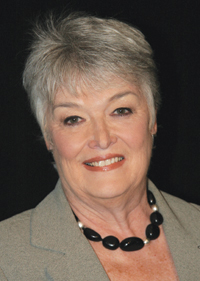 Dr. Patricia Quinn, an Edge Foundation emeritus board member, is an expert on the special ADHD challenges that women and girls face that are different from those of men and boys. These include:
Dr. Patricia Quinn, an Edge Foundation emeritus board member, is an expert on the special ADHD challenges that women and girls face that are different from those of men and boys. These include:
- Under diagnosis due to symptoms that don’t echo the male standard for ADHD
- Hyperactivity presenting as talkativeness and emotional behavior instead of the classic “propelled by a motor.”
- Greater disorganization, depression and anxiety than boys.
We talked with her about the special challenges faced by girls with ADHD and what their parents need to know.
Edge: Is there anything about the challenges ADHD girls and women face that has emerged for you since our last interview?
Dr. Quinn: I think we have seen more in the way of confirming the development of eating disorders in girls with ADHD.
Edge: What, if anything, is unique about diagnosing ADHD girls with eating disorders than is different from other girls?
Dr. Quinn: Well first, the symptom of impulsivity seems to be a significant factor in the development of eating disorders in girls with ADHD. Poor self-esteem may also play a role, but one does not see the impaired body image seen in girls with eating disorders in general. Girls with ADHD may binge and develop bulimia, but not because of a desire for thinness, but rather because of mindless or impulsive eating. Women with ADHD often report that they eat to feel better or for stimulation.
Edge: What should parents do when they suspect their daughter with ADHD has an eating disorder?
Dr. Quinn: Parents of these girls should pursue a complete assessment with an eating disorder specialist trained to realize that ADHD may be part of the picture. Girls will need to be treated for their ADHD symptoms (inattention and impulsivity) in order to be able to follow a program to address their disordered eating. Stimulants not only treat the symptoms of ADHD, but, according to some experts, may actually decrease the urge to binge.
Edge: Is there anything else you want people to know about girls and ADHD?
Dr. Quinn: Girls tend to suffer silently for many years, and as a result develop poor self-esteem early on. In addition, many develop anxiety because of their untreated ADHD symptoms. Their symptoms seem to sneak up and ambush them and they worry that this will happen again. So, they get anxious or develop compensatory strategies. They may worry and begin checking to see if they have a test they have forgotten about, or a book they forgot to bring home from school.
They can even develop obsessive compulsive personality disorders where they try to control one aspect of their life to the exclusion of others. I have seen girls with ADHD become perfectionists to compensate for their symptoms. They spend a great amount of time and energy trying to compensate until it all gets too much for them and they get depressed or just give up. It is, therefore, important to treat ADHD in girls even if they seem to be doing well academically and holding it all together because they may be doing so at a great cost.
I also want to send the overall message that the disorder does not remit but continues to cause significant problems and functional impairments particularly in girls with the inattentive type ADD.
Edge: What would you say, then to parents who are hoping their daughter will just “outgrow it?”
Dr. Quinn: ADHD is a chronic, life-long disorder. Symptoms may be less impairing as we learn to live with them and develop strategies and a life style to better cope. However, girls who demonstrate the most success are those that have adopted a multi-pronged approach to treating the disorder including, medication, therapy and appropriate treatment goals early on. ADHD coaching, like the Edge Foundation offers, can be an important component in learning compensatory strategies and behaviors. Girls who as adolescents continue to have significant functional impairments are those who are usually not taking medication even though they have briefly made use of other services in and outside of school. These, however, may not be enough.
Edge: What are some of the most common questions you are asked about women and girls who have ADHD?
DR. Quinn: I am constantly asked why girls and women aren’t diagnosed as early as boys. I think this is because girls are not identified by teachers or others. Often teachers are comparing girls’ behaviors to those of boys rather than the performance of other girls. Mothers may be more likely to compare their daughter’s behavior to that of other girls thus may be more reliable at referring their daughters for an evaluation. Girls are less disruptive and don’t call attention to themselves, so they don’t get referred. In addition girls and women work hard to compensate for their symptoms and to not let others know the problems that they are having.
Edge: Do women’s hormones have any impact on how medication levels need to be prescribed over time? For instance, does going through puberty or menopause mean medication levels need to be adjusted during those periods?
Dr. Quinn: When hormone levels decrease in menopause many women report that their ADHD symptoms increase and that their medications don’t seem to be as effective as previously. It is often necessary to increase the dose of medications at this time. In addition, I find that during puberty symptoms often worsen in girls with ADHD. A medication dose that worked previously may no longer be effective during this time.
Edge: You’ve been a long-standing champion for women and girls who have ADHD, do you see the rest of the medical profession catching up in awareness or is there still a lot of ground to cover until females with ADHD receive equal medical treatment?
Dr. Quinn: I think that overall the medical profession is doing a better job at recognizing and treating girls with ADHD. The problem seems to be with educating teachers and school systems about the disorder in females.
 Dr. Patricia Quinn is a developmental pediatrician specializing in child development and psychopharmacology who has worked for over 30 years in the areas of ADHD and learning disabilities. She has published numerous books on ADHD. She also gives workshops nationwide and has appeared on numerous television programs such as Lifetime’s New Attitudes, To The Contrary for PBS, and Good Morning America. In the last decade, she has devoted her attention professionally to the issues confronting girls and women with ADD (ADHD). She has a strong commitment to working with teenagers with ADHD, helping them to identify and manage issues specific to their age group. In 2000, Dr. Quinn received the CHADD Hall of Fame Award. She is also co-editor of ADDvance: A Magazine for Women with ADD and is co-founder and currently director of the non-profit organization, The National Center for Girls and Women with ADHD. She is currently working on a book for girls, ages 8 to 12 years, who have ADD.
Dr. Patricia Quinn is a developmental pediatrician specializing in child development and psychopharmacology who has worked for over 30 years in the areas of ADHD and learning disabilities. She has published numerous books on ADHD. She also gives workshops nationwide and has appeared on numerous television programs such as Lifetime’s New Attitudes, To The Contrary for PBS, and Good Morning America. In the last decade, she has devoted her attention professionally to the issues confronting girls and women with ADD (ADHD). She has a strong commitment to working with teenagers with ADHD, helping them to identify and manage issues specific to their age group. In 2000, Dr. Quinn received the CHADD Hall of Fame Award. She is also co-editor of ADDvance: A Magazine for Women with ADD and is co-founder and currently director of the non-profit organization, The National Center for Girls and Women with ADHD. She is currently working on a book for girls, ages 8 to 12 years, who have ADD.



Mary Ann Thompson
A question for Dr. Quinn,
Since girls are not diagnosed at as earlier age as boys, what symptoms might a young girl 9 (age 8 or 9) exhibit that would call for testing? What specifically could a teacher or parent look for?
Thanks!
Mary ann Thompson, ACC Edge Foundaton Coach
Peggy -- Edge Foundation blogger
Thanks for your question, Mary. I’ll pass it on to Dr. Quinn to see what she says.
Carmen Brezna
My daughter discontinued her medication in her freshman year of college because the side effects made her unable to socialize or interact to make new friends. Since then she has struggled with her academics, impulsiveness, relationships, and agitation. She started three months ago on Yaz (for PPMD), and within the first two weeks of treatment I saw a huge decline in her ADHD symptoms. Should girls have their hormone levels checked at this age?
Peggy -- Edge Foundation blogger
I’ve passed on your question to Doctor Quinn to see if we can get an answer now, or in an upcoming interview with her. Thanks for sharing your story.
Grace
My daughter 18yrs old studying in Highschool. She is suffering from learning disabilities and maths problem and some behaviour problem also. When she was 10yrs old her school arranged students analysis with a medical team. They told my daughter IQ is 15 to 20% lesser than her age group. They advised as to show her to a psychologist. He started medications and he told she will be alright when she will reach 17yrs. But she started gaining weight too much our physician advised to stop the medication and opinion from neurologist. According to his evaluation no need for medication and we changed her to an open school. But now she is studying in normal school and final year in school. Can u please help me to guide her and to diagnose her situation. Last year we again consulted a doctor and he told us this is ADHD and started medications. But my daughter is very calm and quiet. Rarely she gets angry. Some what withdrawn type. Please help me.
Peggy -- Edge Blogger
It sure sounds like she could benefit from a coach. Start by completing the Get More Information form, and we’ll get back to you within a business day. Or give us a call, 1-888-718-8886. We can’t diagnose your daughter, but we can work with her in seven areas that will help her be more effective in school and in life
1. scheduling,
2. goal setting,
3. confidence building,
4. organizing,
5. focusing,
6. prioritizing, and
7. persisting at tasks.
Rachel T
My son (9) has been diagnosed with ADHD, but most other parents and teachers say he doesn’t act like he has it. So I’ve looked and looked and am reading Attention, Girls! And it describes his symptoms, but how do I tell people (or him) he has “girl ADHD? Are there any “boy” books about the same type of ADHD? I want to share this book with him, but he’s going to be hitting puberty any day now (I hope not too soon) and I don’t want him to think I’m questioning his masculinity.
Any advice?
Peggy Dolane
One book you might want to try is the Survival Guide for Kids with ADD or ADHD. Girls are more frequently diagnosed with ADD. This guide speaks to both types of ADHD and isn’t “girly!” 🙂
The Speed of Hypocrisy: How America Got Hooked on Legal Meth – MDbad
[…] in sweets and starchy snacks can apparently be more of a sign of ADHD than bad grades. As Quinn told an “ADD coaching” website, “It is important to treat ADHD in girls even if they seem to be […]